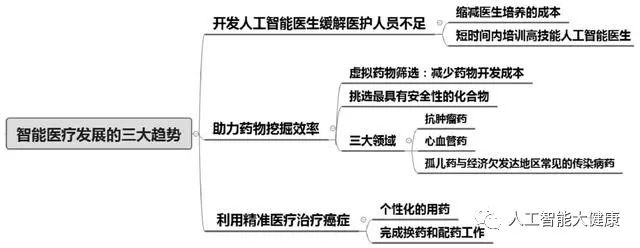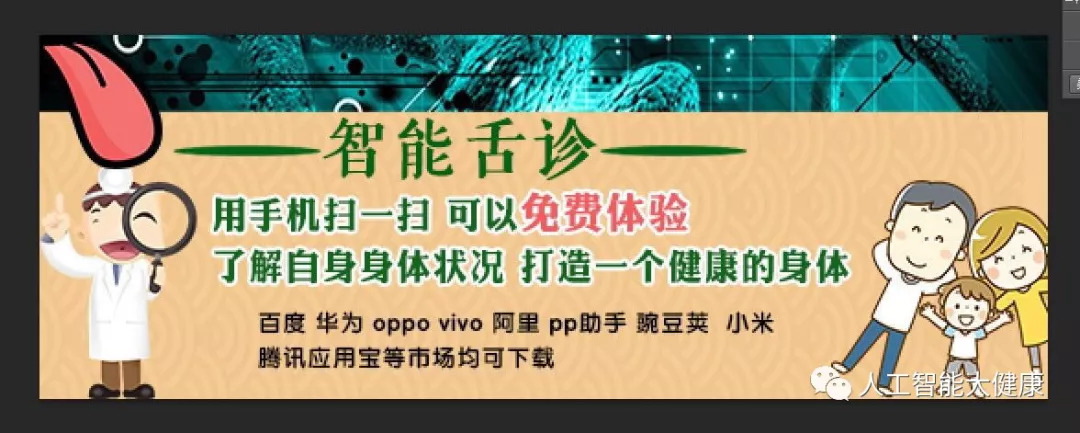The impact of artificial intelligence on medical care is not limited to the intelligent diagnosis, intelligent treatment, health management and medical management as outlined above. Others such as drug discovery, biotechnology and precision medicine can also play a huge role in artificial intelligence. field. From the above analysis, artificial intelligence will further promote the development of the medical field in the direction of intelligence, daily life and humanization. It is especially important to promote the development of precision medicine. At the same time, these changes will have an important impact on employment in the medical industry and human understanding of itself. From the current point of view, the development of artificial intelligence in the future has the following three positive trends worthy of attention: First, the use of artificial intelligence "doctors" to supplement human health care personnel to solve the problem of scarcity of future medical staff; Second, the use of artificial Intelligently improve the efficiency of drug excavation and accelerate the process of drug development. Third, on the basis of artificial intelligence, improve the level of personalized medicine, and finally solve the problem of cancer through precision medicine. The following is divided into the following.

First, develop artificial intelligence doctors to alleviate the shortage of medical staff. The cultivation process of human doctors is very complicated, and the cost is relatively high, and the cultivation time is long. For example, in the United States, the medical profession requires students to come back after completing their undergraduate degree. Even in developed countries, the lack of experienced medical staff is a norm. Once the technical application of artificial intelligence is broken, a large number of artificial intelligence doctors with relevant skills can be trained in a relatively short period of time, which can effectively solve the problem of insufficient resources of human doctors. Moreover, these doctors can provide medical services 24 hours a day, anywhere in the world. Of course, this does not mean that all human doctors will disappear in the future. In some very complicated work, the role of human doctors is still irreplaceable, at least for a certain period of time. In addition, the daily diagnosis or programmatic work is done by artificial intelligence, which will save medical costs.
With the rapid advancement of artificial intelligence technology, the future scenario will be: average doctors will make artificial intelligence as assistants, while doctors below average will be artificial intelligence assistants. If the data and images used to diagnose the disease or the prognosis can be standardized, quantified, and structured, these tasks can be basically accomplished by artificial intelligence. After determining the corresponding data range and specific algorithms, artificial intelligence can gradually improve the diagnostic system and treatment process through continuous machine learning and accumulation. Although artificial intelligence is not a panacea at present, it does surpass humans in some specific work, thus replacing the existing role of some people.
Therefore, in the face of the development of artificial intelligence, the development of the medical industry must accelerate the development of related technology applications, and coordinate the cooperation between human doctors and artificial intelligence. In this respect, China's "micro-medicine" is a typical product. “Micro-medicine†is a mobile Internet medical health service platform that can provide Internet medical services such as appointment registration, online consultation, remote consultation, electronic prescription, and drug delivery. On this platform, a large number of patients upload image data every day and request relevant experts to assist in diagnosis. On the one hand, the help of medical artificial intelligence can save doctors a lot of repetitive work, so that image data and cases can be first reviewed by machine, and then reviewed by experts, the efficiency will increase by more than 70%, on the other hand, it can also be provided to grassroots doctors. With the aid of medical treatment, about 80% of common diseases can be assisted by artificial intelligence to assist the primary doctors, and about 20% of the complex cases can be remotely consulted by experts on the Internet platform, thus improving the level of diagnosis and treatment at the grassroots level.
Second, artificial intelligence helps drug excavation efficiency. Excavation and screening of drugs has always been an important area of ​​the medical industry. In other words, the level and scale of drug research and development determine the development pattern of the medical industry to some extent. Historically, drug mining has gone through three stages: random screening drugs, combinatorial chemical library screening, and virtual drug screening. Initially, the typical practice of randomly screening drugs was to screen for antibiotics from natural sources by bacterial culture, which is inefficient. With the advent of combinatorial chemistry, one can quickly synthesize a large number of compounds, and on this basis, high-throughput screening techniques are used to complete the screening of compounds. The disadvantage of this approach is mainly due to the high cost of research and development. In the virtual drug screening phase, one can simulate the drug screening process on a computer to predict the possible activity of the compound for more targeted physical screening, which can greatly reduce drug development costs. As a result, the medical field has long been used to apply computer technology and artificial intelligence to drug excavation, and has played a positive role.
So far, the development of new drugs still requires extremely high costs, both long-term experiments and billions or even billions of dollars in investment, and repeated safety tests, and even then, there is no guarantee that the final Can be successful. The application of artificial intelligence can alleviate the corresponding problems to a large extent. For example, in the screening of new drugs, you can use the strategic network and evaluation network of artificial intelligence and the Monte Carlo Tree Search algorithm to select the most secure among the thousands of candidate compounds. Compound, the best candidate for new drugs. Artificial intelligence can also assist in the safety testing of new drugs, that is, by analyzing the side effects of known drugs, pre-determining the side effects and size of the new drugs, thereby selecting those drugs with the least harmful side effects to enter animal experiments and human trials. , which greatly saves time and cost.
According to researchers, about 15% to 20% of new drug development costs are spent in the exploration phase. This means hundreds of millions of dollars in costs, as well as years of research and development. At present, in the field of drug excavation, the startup company Atomwise in San Francisco is the most representative. Atomwise focuses on the use of deep learning neural networks to discover new drugs. Specifically, it uses supercomputers, artificial intelligence, and sophisticated algorithms to simulate pharmaceutical processes to predict the effectiveness of new drugs while reducing R&D costs. This has enabled the company not only to have strong drug discovery capabilities, but also to significantly reduce the cost of discovering and developing new drugs. For example, in 2015, the company announced progress in finding Ebola treatment options. That is to say, two of the drugs predicted by Atomwise may be used to fight the Ebola virus, and these findings take only seven days and cost no more than $1,000.
Third, the use of artificial intelligence and precision medicine to treat cancer. Artificial intelligence also plays a huge role in promoting the development of precision medicine. As early as 2011, the National Academy of Sciences, the National Institutes of Health, the National Academy of Engineering, and the National Science Council of the United States jointly issued an initiative to "advance toward precision medicine." With the development of big data and artificial intelligence, the development of precision medicine has also obtained the corresponding technical foundation. As mentioned earlier, artificial intelligence has made great progress in the accuracy of cancer diagnosis. With big data and artificial intelligence, doctors can detect different lesions of different cancer patients, find personalized medications, and then use artificial intelligence to complete dressing and dispensing work, greatly reducing the cost of treatment.
Cancer is one of the typical conditions that require precise treatment. Cancer cells come from the body and are very similar to normal cells. It is difficult to accurately find all cancer cells during the treatment, so it is difficult to eradicate the disease. Cancer surgery can only remove lesions that can be seen by the naked eye, but not for cancer cells that have metastasized or are present in the blood and lymph. These unremoved cancer cells will re-grow, leading to cancer recurrence and metastasis. Although chemotherapy drugs can play a certain role, cancer cells may develop drug resistance, and the patient's immune function will decline, which is also likely to cause cancer to repeat.
Therefore, a very important principle in the treatment of cancer is that each cancer patient needs to develop a personalized treatment plan according to the specific condition, instead of adopting a general treatment plan that is not targeted. Therefore, if a specialized treatment team prepares a drug for a cancer patient and responds to changes in cancer cells quickly enough, the cancer cells can be completely killed. However, if treated according to this scheme, the cost is very high, even reaching hundreds of millions of dollars. Therefore, this treatment is very uneconomical and difficult for most patients.
Based on this characteristic of cancer, you can rely on big data and artificial intelligence to improve the pertinence and accuracy of treatment. According to current research, genetic errors that cause tumorigenesis are on the order of tens of thousands, while known cancers are on the order of hundreds. Therefore, the combination of all possible malignant gene replication errors and cancers ranges from a few million to tens of millions. This magnitude is super-large in terms of human cognition, but it is very small in the realm of big data and artificial intelligence. Therefore, through artificial intelligence for big data analysis, different lesions of different people can be detected more specifically, so as to find a personalized medicine suitable for a specific situation. At the same time, artificial intelligence and big data can also be used to detect new lesions in patients, which can help cancer patients to replace new drugs in time. In addition, these dressing and dispensing processes can be performed on an artificial intelligence platform, which also greatly reduces the cost of drug use. According to this trend, human beings will overcome the cancer problem in the future and will no longer be a fantasy.

Plant Protein Peptide, is extracted from plants or crops a water-soluble protein, and has a potent deduction skin melanin, fade and prevent the formation of melanin, a significant increase in skin moisture ability to hold heat, minus the senescent cells on the surface of the skin, soften keratinized skin cells, promote cells metabolism, accelerate the microcirculation of blood capillary, Enhance the connection of collagen between cells, leaving skin white, soft, glittering and elastic.
Recognized at home and abroad specific scavengers of oxygen free radicals. With anti-aging effect, it can be directly absorbed by the human body quickly and participate in the regulation of metabolism. It is an essential and important raw material for skin care and beauty cosmetics and health products. The market demand is large, the supply is short, and the price is rising year by year. However, in China, the plant protein peptides extracted from soybean, corn, peanut and other crops are abundant in source, low cost, easy to extract and purify, and high purity plant protein peptides can be obtained by conventional separation and purification method.
We provide a variety of plant protein peptide products, including Oats Protein peptide Powder, Soybean Protein peptide Powder, Pea protein peptide powder, Wheat protein peptide powder, Quinoa peptide powder, Ginseng Oligopeptide powder, Walnut peptide powder etc.
Plant Peptide,Plant Organic Peptide,Plant Extract Peptides,Natural Plant Peptides
Allied Extracts Solutions , https://www.nballiedbiosolutions.com